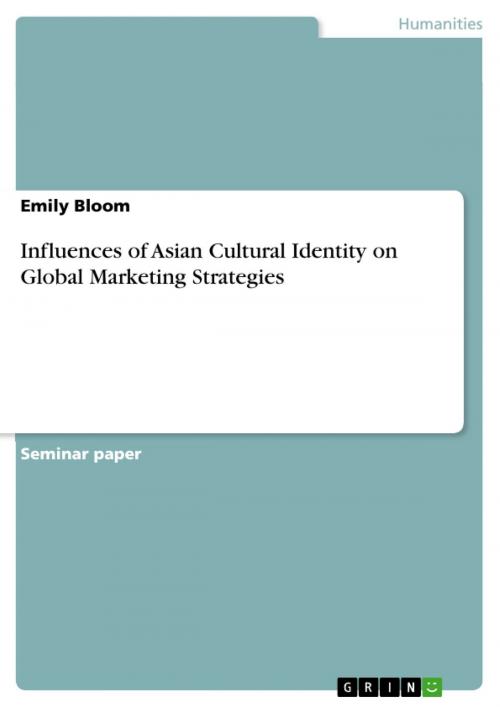Influences of Asian Cultural Identity on Global Marketing Strategies
Nonfiction, Social & Cultural Studies, Social Science, Anthropology| Author: | Emily Bloom | ISBN: | 9783668077560 |
| Publisher: | GRIN Verlag | Publication: | October 30, 2015 |
| Imprint: | GRIN Verlag | Language: | English |
| Author: | Emily Bloom |
| ISBN: | 9783668077560 |
| Publisher: | GRIN Verlag |
| Publication: | October 30, 2015 |
| Imprint: | GRIN Verlag |
| Language: | English |
Seminar paper from the year 2014 in the subject Cultural Studies - Miscellaneous, grade: 1,0, University of Greenwich, language: English, abstract: This paper discusses the influence of Asian cultural identity on Global Marketing. Over the course of the past decades globalisation has had a great impact on the every day lives of people around the globe. Due to the advances in technology and new inventions, such as the internet and therefore the diminishing of boundaries, people from various countries of the world are now more than ever able to be connected to each other, travel and overcome far distances, as well as purchase and consume products and services from all over the world. The benefits of globalisation not only influence people in their daily lifes, but can also be applied to the way in which companies organise themselves as well as operate in their home and foreign markets. The rise of global companies that sell and market products in foreign countries affected organisational work and created the need for global marketing strategies. In order for these strategies to work the different cultural backgrounds and values of customers need to be taken into account. Mooij supports this idea by pointing out, that in order for marketing or advertising to be effective it 'must include values that match the values of the consumers being addressed' (Mooij, 1998, p.91). Mooij explains further, that the way in which consumers behave and are motivated largely depends on their culture, which is why marketing strategies need to be relevant to the culture of the consumer they are trying to address (Mooij M. D., 1998). This explains why marketing managers today face a number of challenges and are influenced by the cultural identity of the country they are marketing a product in. Asia has one of the largest economies of the world which makes it extremely attractive for companies seeking to expand globally. East Asia alone is home to about 20 percent of the world's population and is likely to make up an equally high share of the world trade (Chaze, 2010). In the following, this essay will try to explain how the Asian culture in terms of group, family and status orientation might culturally influence the way in which foreign companies market their products to Asian consumers as well as discuss possible practical measures that should be taken by international marketers in this context.
Seminar paper from the year 2014 in the subject Cultural Studies - Miscellaneous, grade: 1,0, University of Greenwich, language: English, abstract: This paper discusses the influence of Asian cultural identity on Global Marketing. Over the course of the past decades globalisation has had a great impact on the every day lives of people around the globe. Due to the advances in technology and new inventions, such as the internet and therefore the diminishing of boundaries, people from various countries of the world are now more than ever able to be connected to each other, travel and overcome far distances, as well as purchase and consume products and services from all over the world. The benefits of globalisation not only influence people in their daily lifes, but can also be applied to the way in which companies organise themselves as well as operate in their home and foreign markets. The rise of global companies that sell and market products in foreign countries affected organisational work and created the need for global marketing strategies. In order for these strategies to work the different cultural backgrounds and values of customers need to be taken into account. Mooij supports this idea by pointing out, that in order for marketing or advertising to be effective it 'must include values that match the values of the consumers being addressed' (Mooij, 1998, p.91). Mooij explains further, that the way in which consumers behave and are motivated largely depends on their culture, which is why marketing strategies need to be relevant to the culture of the consumer they are trying to address (Mooij M. D., 1998). This explains why marketing managers today face a number of challenges and are influenced by the cultural identity of the country they are marketing a product in. Asia has one of the largest economies of the world which makes it extremely attractive for companies seeking to expand globally. East Asia alone is home to about 20 percent of the world's population and is likely to make up an equally high share of the world trade (Chaze, 2010). In the following, this essay will try to explain how the Asian culture in terms of group, family and status orientation might culturally influence the way in which foreign companies market their products to Asian consumers as well as discuss possible practical measures that should be taken by international marketers in this context.















